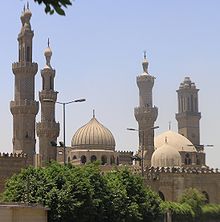
Al-Azhar Mosque is a mosque in Islamic Cairo in Egypt. Al-Mu‘izz li-Dīn Allāh of the Fatimid Caliphate commissioned its construction for the newly-established capital city in 970. Its name is usually thought to allude to the Islamic prophet Muhammad's daughter Fatimah, a revered figure in Islam who was given the title az-Zahrā′ ("the shining one"). It was the first mosque established in Cairo, a city that has since gained the nickname "the city of a thousand minarets."[nb 1]
After its dedication in 972, and with the hiring by mosque authorities of 35 scholars in 989, the mosque slowly developed into what is today the second oldest continuously run university in the world after Al Karaouine. Al-Azhar University has long been regarded as the foremost institution in the Islamic world for the study of Sunni theology and sharia, or Islamic law. The university, integrated within the mosque as part of a mosque school since its inception, was nationalized and officially designated an independent university in 1961, following the Egyptian Revolution of 1952.
Over the course of its over a millennium-long history, the mosque has been alternately neglected and highly regarded. Because it was founded as an Ismāʿīli institution, Saladin and the Sunni Ayyubid dynasty that he founded shunned al-Azhar, removing its status as a congregational mosque and denying stipends to students and teachers at its school. These moves were reversed under the Mamluk Sultanate, under whose rule numerous expansions and renovations took place. Later rulers of Egypt showed differing degrees of deference to the mosque and provided widely varying levels of financial assistance, both to the school and to the upkeep of the mosque. Today, al-Azhar remains a deeply influential institution in Egyptian society and a symbol of Islamic Egypt.
